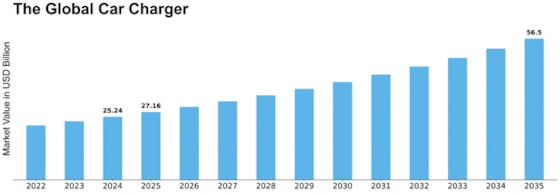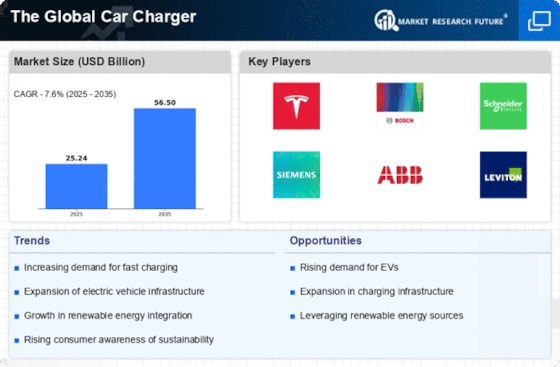-
EXECUTIVE SUMMARY
-
MARKET INTRODUCTION
-
Definition
-
Scope of the Study
- Research Objective
- Assumptions
- Limitations
-
RESEARCH METHODOLOGY
-
Overview
-
Data Mining
-
Secondary Research
-
Primary Research
- Primary Interviews and Information Gathering Process
- Breakdown of Primary Respondents
-
Forecasting Model
-
Market Size Estimation
- Bottom-Up Approach
- Top-Down Approach
-
Data Triangulation
-
Validation
-
MARKET DYNAMICS
-
Overview
-
Drivers
-
Restraints
-
Opportunities
-
MARKET FACTOR ANALYSIS
-
Value Chain Analysis
-
Porter’s Five Forces Analysis
- Bargaining Power of Suppliers
- Bargaining Power of Buyers
- Threat of New Entrants
- Threat of Substitutes
- Intensity of Rivalry
-
COVID-19 Impact Analysis
- Market Impact Analysis
- Regional Impact
- Opportunity and Threat Analysis
-
CAR CHARGER MARKET,BY CHARGING TYPE
-
Overview
-
Manual Charging
-
Automatic Charging
-
CAR CHARGER MARKET,BY CHARGER TYPE
-
Overview
-
Smart/Intelligent Charger
-
Float Charger
-
Trickle Charger
-
CAR CHARGER MARKET,BY PORTABILITY
-
Overview
-
Plug-In Charger
-
Portable Charger
-
CAR CHARGER MARKET, BY BATTERY CAPACITY
-
Overview
-
Up to 12V
-
12V-48V
-
Above 48V
-
CAR CHARGER MARKET, BY PRODUCT TYPE
-
Overview
-
Car Battery Charger
-
Electric Car Battery Charger
-
CAR CHARGER MARKET, BY APPLICATION
-
Overview
-
Garage
-
Personal Use
-
CAR CHARGER MARKET, BY REGION
-
Overview
-
North America
- US
- Canada
-
Europe
- Germany
- France
- UK
- Italy
- Spain
- Rest of Europe
-
Asia-Pacific
- China
- India
- Japan
- South Korea
- Australia
- Rest of Asia-Pacific
-
Rest of the World
- Middle East
- Africa
- Latin America
-
COMPETITIVE LANDSCAPE
-
Overview
-
Competitive Analysis
-
Market Share Analysis
-
Major Growth Strategy in the CAR CHARGER MARKET,
-
Competitive Benchmarking
-
Leading Players in Terms of Number of Developments in the CAR CHARGER MARKET,
-
Key developments and Growth Strategies
- New ProductLaunch/Service Deployment
- Merger &Acquisitions
- Joint Ventures
-
Major Players Financial Matrix
- Sales & Operating Income,2022
- Major Players R&D Expenditure.2022
-
COMPANY PROFILES
-
CTEK Holding AB,
- Company Overview
- Financial Overview
- Products Offered
- Key Developments
- SWOT Analysis
- Key Strategies
-
Delphi Automotive,
- Company Overview
- Financial Overview
- Products Offered
- Key Developments
- SWOT Analysis
- Key Strategies
-
Schumacher Electric Corporation,
- Company Overview
- Financial Overview
- Products Offered
- Key Developments
- SWOT Analysis
- Key Strategies
-
Clore Automotive LLC,
- Company Overview
- Financial Overview
- Products Offered
- Key Developments
- SWOT Analysis
- Key Strategies
-
Baccus Global LLC,
- Company Overview
- Financial Overview
- Products Offered
- Key Developments
- SWOT Analysis
- Key Strategies
-
Robert Bosch GmbH,
- Company Overview
- Financial Overview
- Products Offered
- Key Developments
- SWOT Analysis
- Key Strategies
-
Current Ways Inc,
- Company Overview
- Financial Overview
- Products Offered
- Key Developments
- SWOT Analysis
- Key Strategies
-
AeroVironment, Inc.,
- Company Overview
- Financial Overview
- Products Offered
- Key Developments
- SWOT Analysis
- Key Strategies
-
IES Synergy and Chargemaster Plc,
- Company Overview
- Financial Overview
- Products Offered
- Key Developments
- SWOT Analysis
- Key Strategies
-
APPENDIX
-
References
-
Related Reports
-
-
LIST OF TABLES
-
CAR CHARGER MARKET, SYNOPSIS, 2018-2032
-
CAR CHARGER MARKET, ESTIMATES &FORECAST, 2018-2032(USD BILLION)
-
CAR CHARGER MARKET,BY CHARGING TYPE, 2018-2032 (USD BILLION)
-
CAR CHARGER MARKET,BY CHARGER TYPE, 2018-2032 (USD BILLION)
-
CAR CHARGER MARKET,BY PORTABILITY, 2018-2032 (USD BILLION)
-
CAR CHARGER MARKET, BY BATTERY CAPACITY, 2018-2032 (USD BILLION)
-
CAR CHARGER MARKET, BY PRODUCT TYPE, 2018-2032 (USD BILLION)
-
CAR CHARGER MARKET, BY APPLICATION, 2018-2032 (USD BILLION)
-
NORTH AMERICA: CAR CHARGER MARKET,BY CHARGING TYPE, 2018-2032 (USD BILLION)
-
NORTH AMERICA: CAR CHARGER MARKET,BY CHARGER TYPE, 2018-2032 (USD BILLION)
-
NORTH AMERICA: CAR CHARGER MARKET,BY PORTABILITY, 2018-2032 (USD BILLION)
-
NORTH AMERICA: CAR CHARGER MARKET,BY BATTERY CAPACITY,2018-2032 (USD BILLION)
-
NORTH AMERICA: CAR CHARGER MARKET,BY PRODUCT TYPE,2018-2032 (USD BILLION)
-
NORTH AMERICA: CAR CHARGER MARKET,BY APPLICATION,2018-2032 (USD BILLION)
-
US: CAR CHARGER MARKET,BY CHARGING TYPE, 2018-2032 (USD BILLION)
-
US: CAR CHARGER MARKET,BY CHARGER TYPE, 2018-2032 (USD BILLION)
-
US: CAR CHARGER MARKET,BY PORTABILITY, 2018-2032 (USD BILLION)
-
US: CAR CHARGER MARKET,BY BATTERY CAPACITY,2018-2032 (USD BILLION)
-
US: CAR CHARGER MARKET,BY PRODUCT TYPE,2018-2032 (USD BILLION)
-
US: CAR CHARGER MARKET,BY APPLICATION,2018-2032 (USD BILLION)
-
CANADA: CAR CHARGER MARKET,BY CHARGING TYPE, 2018-2032 (USD BILLION)
-
CANADA: CAR CHARGER MARKET,BY CHARGER TYPE, 2018-2032 (USD BILLION)
-
CANADA: CAR CHARGER MARKET,BY PORTABILITY, 2018-2032 (USD BILLION)
-
CANADA: CAR CHARGER MARKET,BY BATTERY CAPACITY,2018-2032 (USD BILLION)
-
CANADA: CAR CHARGER MARKET,BY PRODUCT TYPE,2018-2032 (USD BILLION)
-
CANADA: CAR CHARGER MARKET,BY APPLICATION,2018-2032 (USD BILLION)
-
EUROPE: CAR CHARGER MARKET,BY CHARGING TYPE, 2018-2032 (USD BILLION)
-
EUROPE: CAR CHARGER MARKET, BY CHARGER TYPE, 2018-2032 (USD BILLION)
-
EUROPE: CAR CHARGER MARKET, BY PORTABILITY, 2018-2032 (USD BILLION)
-
EUROPE: CAR CHARGER MARKET,BY BATTERY CAPACITY,2018-2032 (USD BILLION)
-
EUROPE: CAR CHARGER MARKET,BY PRODUCT TYPE,2018-2032 (USD BILLION)
-
EUROPE: CAR CHARGER MARKET,BY APPLICATION,2018-2032 (USD BILLION)
-
GERMANY: CAR CHARGER MARKET,BY CHARGING TYPE,2018-2032 (USD BILLION)
-
GERMANY: CAR CHARGER MARKET, BY CHARGER TYPE, 2018-2032 (USD BILLION)
-
GERMANY: CAR CHARGER MARKET, BY PORTABILITY, 2018-2032 (USD BILLION)
-
GERMANY: CAR CHARGER MARKET,BY BATTERY CAPACITY,2018-2032 (USD BILLION)
-
GERMANY: CAR CHARGER MARKET,BY PRODUCT TYPE,2018-2032 (USD BILLION)
-
GERMANY: CAR CHARGER MARKET,BY APPLICATION,2018-2032 (USD BILLION)
-
FRANCE: CAR CHARGER MARKET,BY CHARGING TYPE, 2018-2032 (USD BILLION)
-
FRANCE: CAR CHARGER MARKET, BY CHARGER TYPE, 2018-2032 (USD BILLION)
-
FRANCE: CAR CHARGER MARKET, BY PORTABILITY, 2018-2032 (USD BILLION)
-
FRANCE: CAR CHARGER MARKET,BY BATTERY CAPACITY,2018-2032 (USD BILLION)
-
FRANCE: CAR CHARGER MARKET,BY PRODUCT TYPE,2018-2032 (USD BILLION)
-
FRANCE: CAR CHARGER MARKET,BY APPLICATION,2018-2032 (USD BILLION)
-
ITALY: CAR CHARGER MARKET,BY CHARGING TYPE, 2018-2032 (USD BILLION)
-
ITALY: CAR CHARGER MARKET, BY CHARGER TYPE, 2018-2032 (USD BILLION)
-
ITALY: CAR CHARGER MARKET, BY PORTABILITY, 2018-2032 (USD BILLION)
-
ITALY: CAR CHARGER MARKET,BY BATTERY CAPACITY,2018-2032 (USD BILLION)
-
ITALY: CAR CHARGER MARKET,BY PRODUCT TYPE,2018-2032 (USD BILLION)
-
ITALY: CAR CHARGER MARKET,BY APPLICATION,2018-2032 (USD BILLION)
-
SPAIN: CAR CHARGER MARKET,BY CHARGING TYPE, 2018-2032 (USD BILLION)
-
SPAIN: CAR CHARGER MARKET, BY CHARGER TYPE, 2018-2032 (USD BILLION)
-
SPAIN: CAR CHARGER MARKET, BY PORTABILITY, 2018-2032 (USD BILLION)
-
SPAIN: CAR CHARGER MARKET,BY BATTERY CAPACITY,2018-2032 (USD BILLION)
-
SPAIN: CAR CHARGER MARKET,BY PRODUCT TYPE,2018-2032 (USD BILLION)
-
SPAIN: CAR CHARGER MARKET,BY APPLICATION,2018-2032 (USD BILLION)
-
UK: CAR CHARGER MARKET,BY CHARGING TYPE, 2018-2032 (USD BILLION)
-
UK: CAR CHARGER MARKET, BY CHARGER TYPE, 2018-2032 (USD BILLION)
-
UK: CAR CHARGER MARKET, BY PORTABILITY, 2018-2032 (USD BILLION)
-
UK: CAR CHARGER MARKET,BY BATTERY CAPACITY, 2018-2032 (USD BILLION)
-
UK: CAR CHARGER MARKET,BY PRODUCT TYPE, 2018-2032 (USD BILLION)
-
UK: CAR CHARGER MARKET,BY APPLICATION, 2018-2032 (USD BILLION)
-
REST OF EUROPE: CAR CHARGER MARKET,BY CHARGING TYPE, 2018-2032 (USD BILLION)
-
REST OF EUROPE: CAR CHARGER MARKET, BY CHARGER TYPE, 2018-2032 (USD BILLION)
-
REST OF EUROPE: CAR CHARGER MARKET, BY PORTABILITY, 2018-2032 (USD BILLION)
-
REST OF EUROPE: CAR CHARGER MARKET,BY BATTERY CAPACITY,2018-2032 (USD BILLION)
-
REST OF EUROPE: CAR CHARGER MARKET,BY PRODUCT TYPE,2018-2032 (USD BILLION)
-
REST OF EUROPE: CAR CHARGER MARKET,BY APPLICATION,2018-2032 (USD BILLION)
-
ASIA-PACIFIC: CAR CHARGER MARKET,BY CHARGING TYPE, 2018-2032 (USD BILLION)
-
ASIA-PACIFIC: CAR CHARGER MARKET, BY CHARGER TYPE, 2018-2032 (USD BILLION)
-
ASIA-PACIFIC: CAR CHARGER MARKET, BY PORTABILITY, 2018-2032 (USD BILLION)
-
ASIA-PACIFIC: CAR CHARGER MARKET,BY BATTERY CAPACITY,2018-2032 (USD BILLION)
-
ASIA-PACIFIC: CAR CHARGER MARKET,BY PRODUCT TYPE,2018-2032 (USD BILLION)
-
ASIA-PACIFIC: CAR CHARGER MARKET,BY APPLICATION,2018-2032 (USD BILLION)
-
JAPAN: CAR CHARGER MARKET,BY CHARGING TYPE, 2018-2032 (USD BILLION)
-
JAPAN: CAR CHARGER MARKET, BY CHARGER TYPE, 2018-2032 (USD BILLION)
-
JAPAN: CAR CHARGER MARKET, BY PORTABILITY, 2018-2032 (USD BILLION)
-
JAPAN: CAR CHARGER MARKET,BY BATTERY CAPACITY,2018-2032 (USD BILLION)
-
JAPAN: CAR CHARGER MARKET,BY PRODUCT TYPE,2018-2032 (USD BILLION)
-
JAPAN: CAR CHARGER MARKET,BY APPLICATION,2018-2032 (USD BILLION)
-
CHINA: CAR CHARGER MARKET,BY CHARGING TYPE, 2018-2032 (USD BILLION)
-
CHINA: CAR CHARGER MARKET, BY CHARGER TYPE, 2018-2032 (USD BILLION)
-
CHINA: CAR CHARGER MARKET, BY PORTABILITY, 2018-2032 (USD BILLION)
-
CHINA: CAR CHARGER MARKET,BY BATTERY CAPACITY,2018-2032 (USD BILLION)
-
CHINA: CAR CHARGER MARKET,BY PRODUCT TYPE,2018-2032 (USD BILLION)
-
CHINA: CAR CHARGER MARKET,BY APPLICATION,2018-2032 (USD BILLION)
-
INDIA: CAR CHARGER MARKET,BY CHARGING TYPE, 2018-2032 (USD BILLION)
-
INDIA: CAR CHARGER MARKET, BY CHARGER TYPE, 2018-2032 (USD BILLION)
-
INDIA: CAR CHARGER MARKET, BY PORTABILITY, 2018-2032 (USD BILLION)
-
INDIA: CAR CHARGER MARKET,BY BATTERY CAPACITY,2018-2032 (USD BILLION)
-
INDIA: CAR CHARGER MARKET,BY PRODUCT TYPE,2018-2032 (USD BILLION)
-
INDIA: CAR CHARGER MARKET,BY APPLICATION,2018-2032 (USD BILLION)
-
AUSTRALIA: CAR CHARGER MARKET,BY CHARGING TYPE, 2018-2032 (USD BILLION)
-
AUSTRALIA: CAR CHARGER MARKET, BY CHARGER TYPE, 2018-2032 (USD BILLION)
-
AUSTRALIA: CAR CHARGER MARKET, BY PORTABILITY, 2018-2032 (USD BILLION)
-
AUSTRALIA: CAR CHARGER MARKET,BY BATTERY CAPACITY,2018-2032 (USD BILLION)
-
AUSTRALIA: CAR CHARGER MARKET,BY PRODUCT TYPE,2018-2032 (USD BILLION)
-
AUSTRALIA: CAR CHARGER MARKET,BY APPLICATION,2018-2032 (USD BILLION)
-
SOUTH KOREA: CAR CHARGER MARKET,BY CHARGING TYPE, 2018-2032 (USD BILLION)
-
SOUTH KOREA: CAR CHARGER MARKET, BY CHARGER TYPE, 2018-2032 (USD BILLION)
-
SOUTH KOREA: CAR CHARGER MARKET, BY PORTABILITY, 2018-2032 (USD BILLION)
-
SOUTH KOREA: CAR CHARGER MARKET,BY BATTERY CAPACITY,2018-2032 (USD BILLION)
-
SOUTH KOREA: CAR CHARGER MARKET,BY PRODUCT TYPE ,2018-2032 (USD BILLION)
-
SOUTH KOREA: CAR CHARGER MARKET,BY APPLICATION ,2018-2032 (USD BILLION)
-
REST OF ASIA-PACIFIC: CAR CHARGER MARKET,BY CHARGING TYPE, 2018-2032 (USD BILLION)
-
REST OF ASIA-PACIFIC: CAR CHARGER MARKET, BY CHARGER TYPE, 2018-2032 (USD BILLION)
-
REST OF ASIA-PACIFIC: CAR CHARGER MARKET, BY PORTABILITY, 2018-2032 (USD BILLION)
-
REST OF ASIA-PACIFIC: CAR CHARGER MARKET,BY PRODUCT TYPE,2018-2032 (USD BILLION)
-
REST OF ASIA-PACIFIC: CAR CHARGER MARKET,BY BATTERY CAPACITY,2018-2032 (USD BILLION)
-
REST OF ASIA-PACIFIC: CAR CHARGER MARKET,BY APPLICATION,2018-2032 (USD BILLION)
-
REST OF THE WORLD: CAR CHARGER MARKET,BY CHARGING TYPE, 2018-2032 (USD BILLION)
-
REST OF THE WORLD: CAR CHARGER MARKET, BY CHARGER TYPE, 2018-2032 (USD BILLION)
-
REST OF THE WORLD: CAR CHARGER MARKET, BY PORTABILITY, 2018-2032 (USD BILLION)
-
REST OF THE WORLD: CAR CHARGER MARKET,BY BATTERY CAPACITY,2018-2032 (USD BILLION)
-
REST OF THE WORLD: CAR CHARGER MARKET,BY PRODUCT TYPE,2018-2032 (USD BILLION)
-
REST OF THE WORLD: CAR CHARGER MARKET,BY APPLICATION,2018-2032 (USD BILLION)
-
MIDDLE EAST: CAR CHARGER MARKET,BY CHARGING TYPE, 2018-2032 (USD BILLION)
-
MIDDLE EAST: CAR CHARGER MARKET, BY CHARGER TYPE, 2018-2032 (USD BILLION)
-
MIDDLE EAST: CAR CHARGER MARKET, BY PORTABILITY, 2018-2032 (USD BILLION)
-
MIDDLE EAST: CAR CHARGER MARKET,BY BATTERY CAPACITY,2018-2032 (USD BILLION)
-
MIDDLE EAST: CAR CHARGER MARKET,BY PRODUCT TYPE,2018-2032 (USD BILLION)
-
MIDDLE EAST: CAR CHARGER MARKET,BY APPLICATION,2018-2032 (USD BILLION)
-
AFRICA: CAR CHARGER MARKET,BY CHARGING TYPE, 2018-2032 (USD BILLION)
-
AFRICA: CAR CHARGER MARKET, BY CHARGER TYPE, 2018-2032 (USD BILLION)
-
AFRICA: CAR CHARGER MARKET, BY PORTABILITY, 2018-2032 (USD BILLION)
-
AFRICA: CAR CHARGER MARKET,BY BATTERY CAPACITY,2018-2032 (USD BILLION)
-
AFRICA: CAR CHARGER MARKET,BY PRODUCT TYPE,2018-2032 (USD BILLION)
-
AFRICA: CAR CHARGER MARKET,BY APPLICATION,2018-2032 (USD BILLION)
-
LATIN AMERICA: CAR CHARGER MARKET,BY CHARGING TYPE, 2018-2032 (USD BILLION)
-
LATIN AMERICA: CAR CHARGER MARKET, BY CHARGER TYPE, 2018-2032 (USD BILLION)
-
LATIN AMERICA: CAR CHARGER MARKET, BY PORTABILITY, 2018-2032 (USD BILLION)
-
LATIN AMERICA: CAR CHARGER MARKET,BY BATTERY CAPACITY,2018-2032 (USD BILLION)
-
LATIN AMERICA: CAR CHARGER MARKET,BY PRODUCT TYPE,2018-2032 (USD BILLION)
-
LATIN AMERICA: CAR CHARGER MARKET,BY APPLICATION,2018-2032 (USD BILLION)
-
LIST OF FIGURES
-
RESEARCH PROCESS
-
MARKET STRUCTURE FOR THE CAR CHARGER MARKET
-
MARKET DYNAMICS FOR THE CAR CHARGER MARKET
-
CAR CHARGER MARKET, SHARE (%), BY CHARGING TYPE, 2022
-
CAR CHARGER MARKET, SHARE (%), BY CHARGER TYPE, 2022
-
CAR CHARGER MARKET, SHARE (%), BY PORTABILITY, 2022
-
CAR CHARGER MARKET, SHARE (%), BY BATTERY CAPACITY,2022
-
CAR CHARGER MARKET, SHARE (%), BY PRODUCT TYPE,2022
-
CAR CHARGER MARKET, SHARE (%), BY APPLICATION,2022
-
CAR CHARGER MARKET, SHARE (%), BY REGION, 2022
-
NORTH AMERICA: CAR CHARGER MARKET, SHARE (%), BY REGION, 2022
-
EUROPE: CAR CHARGER MARKET, SHARE (%), BY REGION, 2022
-
ASIA-PACIFIC: CAR CHARGER MARKET, SHARE (%), BY REGION, 2022
-
REST OF THE WORLD: CAR CHARGER MARKET, SHARE (%), BY REGION, 2022
-
CAR CHARGER MARKET: COMPANY SHARE ANALYSIS, 2022 (%)
-
CTEK HOLDING AB,: FINANCIAL OVERVIEW SNAPSHOT
-
CTEK HOLDING AB,: SWOT ANALYSIS
-
DELPHI AUTOMOTIVE,:FINANCIAL OVERVIEW SNAPSHOT
-
DELPHI AUTOMOTIVE,:SWOT ANALYSIS
-
SCHUMACHER ELECTRIC CORPORATION,:FINANCIAL OVERVIEW SNAPSHOT
-
SCHUMACHER ELECTRIC CORPORATION,:SWOT ANALYSIS
-
CLORE AUTOMOTIVE LLC,: FINANCIAL OVERVIEW SNAPSHOT
-
CLORE AUTOMOTIVE LLC,:SWOT ANALYSIS
-
BACCUS GLOBAL LLC,.:FINANCIAL OVERVIEW SNAPSHOT
-
BACCUS GLOBAL LLC,.:SWOT ANALYSIS
-
ROBERT BOSCH GMBH,:FINANCIAL OVERVIEW SNAPSHOT
-
ROBERT BOSCH GMBH,:SWOT ANALYSIS
-
CURRENT WAYS INC,: FINANCIAL OVERVIEW SNAPSHOT
-
CURRENT WAYS INC,: SWOT ANALYSIS
-
AEROVIRONMENT, INC.,: FINANCIAL OVERVIEW SNAPSHOT
-
AEROVIRONMENT, INC.,: SWOT ANALYSIS
-
IES SYNERGY AND CHARGEMASTER PLC,: FINANCIAL OVERVIEW SNAPSHOT
-
IES SYNERGY AND CHARGEMASTER PLC,: SWOT ANALYSIS



















Leave a Comment